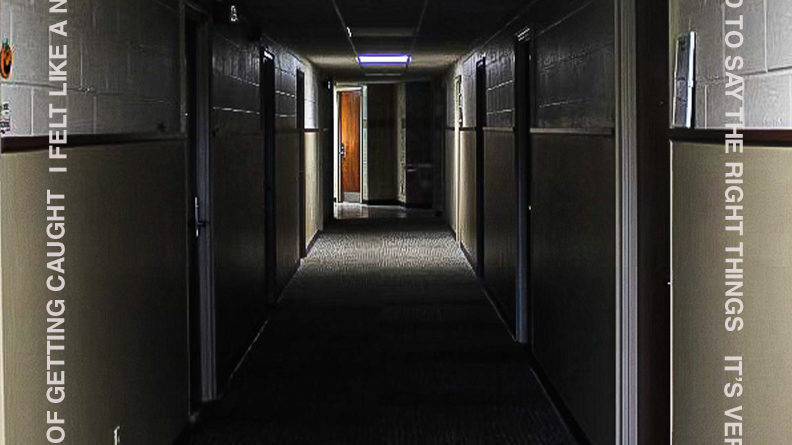The true cost of being an RA
A hallway in Marycrest Complex, a first-year dorm, dimly lit despite being midday. Photo by Kaitlin Lewis, outgoing online editor-in-chief. Graphic design by Keegan Gupta, director of digital media & photography.
Zoë Hill | Print Editor-in-Chief
Reporting by Claire Mahoney, Megan Broderick & Kaitlin Lewis
The offer of free room and board may be enticing to students trying to make it through college without student loans, but resident assistants at the University of Dayton find themselves paying in other ways.
With more than 8,200 undergraduate students, and 95% living in the student neighborhood or the residence halls, being an RA can be a lofty undertaking, according to both current and former student employees with Housing and Residence Life.
Madison Peyton ’21 spent three years working with HRL in order to live on her own and save money through college. She said there was almost always a meeting she was required to be at or busy work that needed to be done.
“Not to mention, you have rounds, one-on-ones with residents and basically have to have an open door policy 24/7,” Peyton said.
Peyton said HRL did not prepare her for what the job asked of her. Some nights she would be up until 2 a.m. on rounds, going door to door to make sure her residents were abiding by dorm rules.
Peyton’s RA duties prevented her from going out with her friends, and she said the job made her feel very alone and hurt her social life. She also mentioned RAs have to get permission from HRL to go home on the weekends.
“It’s very exhausting and I felt like they ask too much of you as just a 20 something year old college student,” Peyton said. “ I would often just feel so overwhelmed and wish I was a ‘normal’ college student.”
Mental Health & Student Deaths
According to the American Psychology Association, social isolation can impact people on a level “very similar in magnitude to that of obesity, smoking, lack of access to care and physical inactivity” and can contribute to depression, anxiety and stress. UD RAs feel that loneliness piled on to their housing duties.
Senior Logan Tate is no longer an RA in large part because he wanted to room with his friends as an upperclassman. He said the loneliness he experienced by living alone as an RA took a toll on his mental health.
“Having a roommate or friend to hang with between the stress of college is something I appreciate, and my friends were all living together in other buildings,” Tate said.
On top of balancing school work, duties of the job and their own mental health, RAs have also had to deal with losing residents, friends and coworkers.
Peyton said she was unprepared to have “extremely difficult conversations” about sucide and self harm, but she had to talk with her residents about those topics.
Several students died during a current female RA’s tenure, and she felt that she had to “be a resource first and an individual second” in order to support her residents.
“I felt like I had to say the right things and make sure my residents knew that I was there for them if they needed me, even if I was not in an emotional state to take on someone else’s feelings,” she said.
Support from HRL
The current RA said she feels like someone is always waiting for her to mess something up, and thought about quitting several times this year because HRL was not being accommodating to her.
“Freshman through junior year, I was terrified of getting caught doing something that would ruin my chances of becoming an RA or that would get me fired,” she said. “I think I missed out on a lot of the ‘college experience’ out of fear of the repercussions and losing my job, but I don’t know that that was necessarily a bad thing.”
She said she tried to “fly under the radar as much as possible” and ended up losing respect for HRL because she felt “disrespected and disregarded” by how they carried things out.
Peyton echoed that sentiment: “I often just felt like a number to HRL and as long as I was doing my job I knew I wouldn’t hear from them.”
However, Tate said HRL was always “super supportive” to him and helped accommodate his football schedule.
The Cost of the Job
Working as an RA for the university has afforded many students the opportunity to build lasting relationships with peers and have room and board paid for, but the costs of the job have weighed heavy on some of the RAs.
“HRL tries to emphasize balance in our lives, but they make it difficult with the time that we have to put into the job,” added the current female RA. “There simply is not time to balance everything.”
For more campus news, like Flyer News on Facebook and follow us on Twitter (@FlyerNews) and Instagram (@flyernews).

